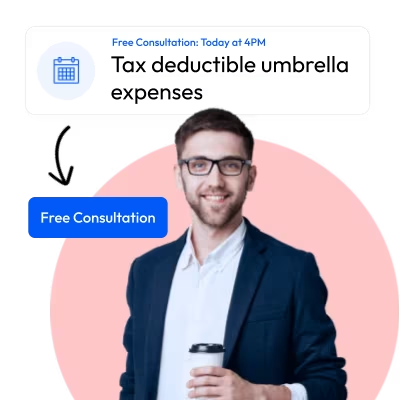Umbrella Company Expenses Explained
Contractors spend ages trying to figure out umbrella company expenses because all they really care about is: how does umbrella expenses affect their take home pay? Umbrella companies love to hype up expenses when they’re trying to win you over, but the details? Those are often hidden away, leaving everyone confused about what’s allowed, what gets taxed, and whether claiming expenses even makes a difference to your pay anymore.
A lot of this confusion kicked off when HMRC changed the rules in April 2016. In the past, umbrella workers could claim all sorts of expenses for travel and meals. But after HMRC tightened things up and started treating most umbrella contractors as employees, most of those benefits disappeared. Travel to your usual workplace, grabbing lunch on the job, hotel stays aren’t tax-free for most umbrella workers anymore.
This article gets straight to the point. You’ll find out exactly how umbrella company expenses work right now in 2026, which costs are usually not allowed, and the rare circumstances where you can still make in a claim. By the end, you’ll finally understand how expenses actually affect your take-home pay and what you should watch out for before choosing an umbrella company.
What are Umbrella Expenses?
Umbrella company expenses are simply the work-related costs you can claim while carrying out your job through an umbrella company. Think of things like train fares to visit a client or payments for professional memberships. These aren’t bonuses or extra money, they’re just the costs you need to cover to do your job.
Once you’ve joined an umbrella company, you’re officially their employee. The umbrella company manages the contract with your client or agency and pays your wages through PAYE. Any expenses you want to claim have to go through them too, usually using an online form or portal. If your expenses meet HMRC’s requirements and the umbrella company’s own policies, they’ll process them together with your pay.
Reimbursed Expenses vs Tax Relief
One thing that often confuses people is the difference between reimbursed expenses and tax relief.
If the umbrella company reimburses you, they’re basically paying you back for what you’ve already spent. But this usually goes through payroll, so it can still be taxed.
Tax relief, on the other hand, just means you pay less income tax, not that you receive extra cash in your pocket. Due to changes in HMRC rules, most umbrella company employees don’t get tax relief on common expenses anymore. That means, for most umbrella workers, claiming expenses doesn’t actually boost their take-home pay these days.
Current HMRC Rules on Umbrella Company Expenses
Currently, HMRC checks if a contractor works under supervision, direction, or control, often called SDC. They want to see if someone else decides how, when, or where you do your work. If that applies, HMRC treats you as working under SDC.
Nearly everyone working through an umbrella company falls into the SDC. For tax purposes, HMRC treats these workers like regular employees. The days of contractors enjoying flexible expense rules are over. Now, the usual employee expense rules apply.
Most of the expenses umbrella workers used to claim previously are not allowed anymore. You can’t claim travel from home to your main workplace, lunch during your shift, or hotel stays near your client’s office. What HMRC does allow is limited. For example:
- business travel between different client sites
- mileage for genuine work journeys
- professional subscriptions to HMRC approved organisations
- uniforms or protective clothing needed for the job
Knowing what’s allowed matters. It helps contractors avoid unexpected tax bills and ensures everyone stays compliant.
What is SDC?
SDC stands for Supervision, Direction, and Control. HMRC uses this rule to determine if someone should be taxed as an employee or as an independent contractor. Basically, SDC looks at how much control someone has over the way they do their job.
Supervision means someone oversees your work and checks what you do.
Direction is when someone tells you exactly how to do your job or which methods to use.
Control is when someone else decides what you do, when you do it, and where you do it.
If any of these apply to your situation, HMRC considers you to be working under SDC.
Most people working through umbrella companies fall under SDC, since clients usually set the hours, locations, and specify how they want the work done. When SDC applies, HMRC treats you as an employee for tax purposes, not as a contractor.
How Do Umbrella Companies Approach SDC?
Umbrella companies deal with SDC in two main ways. Some send out SDC questionnaires, while others just prevent tax relief on expenses for everyone to keep things straightforward.
When they use a questionnaire, they ask contractors the questions like who’s in control, how the work is done, and where it takes place. Contractors need to answer honestly. After that, the umbrella company reviews the answers and decides if SDC applies.
Occasionally, a contractor’s answers show that SDC doesn’t apply. In those cases, the umbrella company looks further, checking the contract and speaking with the agency or end client to get all the facts. But to be honest, this is pretty uncommon. Since the SDC rules started, almost every contractor under an umbrella is caught by SDC.
That’s why many larger umbrella companies have stopped using questionnaires completely. They just assume SDC applies to everyone and won’t allow tax relief for travel or subsistence. It simplifies things and avoids disputes with workers who think SDC shouldn’t apply to them.
If HMRC investigates an SDC case, they examine both the contract and how things really work in practice. If the paperwork doesn’t match the actual working conditions, both the worker and the umbrella company could face penalties.
What Expenses can I Claim for If I’m not Subject to SDC?
If you truly aren’t under Supervision, Direction, or Control (SDC), you have a bit more flexibility with your expenses. This situation is fairly rare for umbrella company workers, but it can happen mainly if you decide how, when, and where you work.
When SDC doesn’t apply, HMRC may treat your assignment as a temporary workplace. This allows you to claim certain travel and work-related expenses that umbrella workers normally can’t.
Below are the main expenses you can claim if SDC does not apply to you.
What Expenses can I Claim through an Umbrella Company?
While most everyday expenses can’t be claimed anymore, umbrella company workers may still be able to claim certain expenses. It usually comes down to three main categories, depending on who pays them and how they relate to your work.
Client Billable Expenses
If your end client or agency has agreed up front to pay, they’ll cover the cost. The umbrella company just passes the payment on to you. This includes:
- Travel or accommodation agreed in the contract
- Project-specific costs approved in advance
Just keep in mind, these don’t reduce your tax bill; they’re just paid because your client agreed to pay them.
Business Costs Required for Your Role
These are the expenses you need to carry out your work. If they meet HMRC rules, your umbrella company could reimburse you. Typical examples include:
- Mileage for business journeys between sites or meetings
- Parking fees for work-related travel
- Professional materials such as textbooks or manuals
- Computer software or tools needed for the role
- Protective clothing or safety equipment
- Training linked directly to your current job
If approved, you usually get these paid back without any tax or National Insurance being deducted.
Non-client Billable Business Expenses
Then there are expenses your client or agency won’t cover, but you might still be able to claim if they qualify as allowable expenses under HMRC rules. To qualify, the cost must be incurred wholly, exclusively, and necessarily for your work.
Common examples include:
- Mileage for approved business journeys
- Professional subscriptions
- Protective clothing
- Stationery, postage, phone and internet
- Business entertainment
Each umbrella company applies its own policy, so they’ll check your claims before approving them. Understanding these categories helps you avoid problems like rejected claims or unexpected deductions.
How to Make Umbrella Company Expense Claims?
Most umbrella companies have an online portal or app to submit expense claims. Just enter your expense details like date, amount, and reason for the cost. Usually, you’ll need to upload a receipt as proof. The company will then review your claim based on HMRC rules and their own guidelines.
If they approve your claim, it’ll be added to your pay. Some expenses are reimbursed through payroll, while others might be paid separately. If something doesn’t meet the rules, they’ll reject it and explain why. Honestly, it helps a lot to read the company’s expense policy first, so you don’t waste time claiming things that won’t be accepted.
Note that even if you cannot claim certain expenses via your umbrella, you might still be able to claim tax relief on certain expenses at the end of the tax year by submitting a Form P87 to HMRC or via self assessment.
Expenses You Usually Cannot Claim Through an Umbrella Company
- Travel from home to your main workplace
This counts as normal commuting, even for short term contracts, so it is not claimable. - Daily commuting costs
Train fares, fuel, parking, tolls, and similar costs for getting to work are treated as personal expenses. - Meals and subsistence
Lunches, snacks, coffees, and meals bought during the working day do not qualify as business expenses. - Accommodation for standard assignments
Hotel stays or rented rooms near the client site are usually seen as personal living costs. - Home office costs in most cases
Working from home does not automatically allow claims for rent, utilities, or broadband under an umbrella company.
How Umbrella Company Expenses Affect Your Take-Home Pay
Many contractors assume that claiming expenses through an umbrella company will increase their take-home pay. But honestly, that’s no longer the case. HMRC updated the rules, and now, most umbrella employees can’t claim the usual expenses tax free. This means expenses don’t reduce your tax bill like they used to, so your pay basically stays the same.
Here’s how your pay actually works. Your gross pay is the amount the client or agency pays for your services. Before you receive anything, the umbrella company deducts employer costs like Employer’s National Insurance and the apprenticeship levy, and umbrella fees. What’s left after that is your taxable pay, which is used to calculate Income Tax and employee National Insurance. After these deductions, you end up with your net pay which is the actual amount that reaches your bank account. Most expenses aren’t involved in this calculation or processed through payroll, so they don’t increase your net pay.
Some umbrella companies add to the confusion by promoting expenses as a way to raise your take-home pay, making contractors think they’ll get more than they actually will. Often, those impressive figures in advertisements are based on outdated rules or unusual situations that don’t apply to most workers.
Umbrella Company Expenses vs Limited Company Expenses
If you’re a contractor, understanding the difference between umbrella company expenses and limited company expenses can make a real difference to your take-home pay. The rules are quite different depending on which path you choose.
Umbrella company expenses are pretty restricted. Since you’re technically an employee of the umbrella company, HMRC treats your expenses just like any other employee’s. That means most things like travel, meals, and hotels aren’t allowed. You don’t usually see much tax saving from claiming expenses here.
With a limited company, you’re in charge. As the director, you run everything. You can claim a broader range of business expenses, as long as they’re genuinely for your work. These claims reduce your company’s profits and your tax bill. You decide when and how to claim them. There’s extra paperwork and responsibility, but you gain more control and, in most cases, a better tax position if you have regular business expenses.
If you want flexibility and don’t mind doing a bit more admin, running a limited company can pay off. Real business costs come right off your profits, and you notice the difference in your tax at year-end.
But not everyone wants the extra hassle. Umbrella companies are ideal if you’re a first-time contractor, only doing a short contract, or don’t want to deal with company admin, accounts, or filings. They’re also common for inside IR35 roles, since the tax advantages are limited anyway. Sometimes, keeping it simple just makes sense.
Should You Use an Umbrella Company if Expenses Matter to You?
An umbrella company is still a sensible choice if you don’t have many business expenses or if your client requires this setup. It’s also suitable for contractors who prefer simplicity and aren’t too concerned about tax efficiency, or for those who move between short-term contracts with breaks in between.
If you have frequent business expenses, secure longer-term contracts, or want greater control over your income, a limited company is usually more tax-efficient. There’s definitely more paperwork and responsibility involved, but if you like to plan ahead and manage your finances carefully, the advantages can outweigh the drawbacks.
Before making a decision, speak to a contractor accountant. The best option depends on your contract terms, income, and preferred way of working. Getting good advice now can help you avoid problems later on.
Don’t Sign Up Yet, Get Clear on Umbrella Company Expenses
If umbrella company expenses feel confusing, you’re definitely not the only one puzzled because rules have changed over the years and most online information is outdated or unclear. Many contractors sign up thinking expenses will increase their pay, only to get an unpleasant shock later when it doesn’t work out that way.
That’s why it’s important to choose an umbrella company that sticks to HMRC rules and explains everything clearly from the start. If someone promises a huge take-home pay just because of expenses, be very skeptical. Choosing the best UK umbrella company might not sound exciting, but it protects you from tax issues and unexpected costs down the line.
Not sure what’s right for you? Speak to our contractor accountant. A quick conversation will clarify how expenses apply to your role and whether you’re better off with an umbrella company or a limited company. Getting good advice early helps you make better decisions and keeps your contracting much less stressful.
FAQs on Umbrella Company Allowable Expenses
Can umbrella company workers claim travel expenses?
In most cases, no. Travel from home to your main workplace counts as normal commuting, so it cannot be claimed. Some travel may still be allowed if it is for genuine business journeys, such as visiting another client site or attending a work meeting during the day.
Are umbrella company expenses tax free?
Most umbrella company expenses are not tax free. Since HMRC rule changes, common costs like commuting, meals, and accommodation usually go through payroll and are taxed. Only a small number of work-related expenses may be paid without tax, and only when they meet HMRC rules.
Do all umbrella companies handle expenses the same way?
No. While all compliant umbrella companies follow HMRC rules, their internal policies can differ. Some allow a narrow range of claims, while others block most expenses altogether. This is why it is important to check an umbrella company’s expense policy before signing up.
Can HMRC investigate umbrella company expense claims?
Yes. HMRC can review expense claims at any time. They look at contracts, payslips, and how the work was actually carried out. If claims do not follow the rules, HMRC may ask for unpaid tax and National Insurance to be repaid, sometimes with penalties.
Is switching to a limited company better for expenses?
It can be. Limited company contractors often have more scope to claim genuine business costs, as long as the expenses relate directly to the work. However, running a limited company comes with more admin and responsibility. The best option depends on your contract, income, and how you prefer to work.
How do I determine my SDC status?
Most umbrella companies assess SDC when you join, often through their own checks or questionnaires. In many cases, they assume SDC applies to stay compliant. If you are unsure, speaking with a contractor tax specialist can help clarify your position and avoid issues later.
Does IR35 affect me as an umbrella employee?
As an umbrella company employee, IR35 does not apply to you. The rules only affect contractors who work through their own limited company. Since umbrella workers are paid through PAYE as employees, IR35 is not relevant to their contract work.
Do I need to keep receipts for expenses?
Yes, you usually need to keep receipts for any expenses you claim through an umbrella company. Most umbrella companies ask you to upload copies when you submit a claim. Even if a claim is approved, it is a good idea to keep the receipts for your own records. If HMRC ever reviews your expenses, they may ask for proof, and having clear records makes the process much easier.














